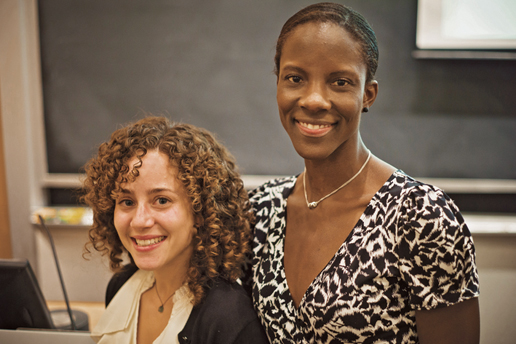Excerpted from the Handshake Quarterly Journal. The Journal is produced by the World Bank’s International Finance Corporation – the largest global development institution focused exclusively on the private sector in developing countries.

e4Dev’s presentations demonstrate serious interest in a range of energy issues in developing countries. Did this interest motivate the formation of the group?
Sarah Dimson: We created e4Dev for two primary reasons. First, to address an evident need for a space where those who are working at various intersections of energy and human development could discuss and debate their work. Secondly, to bring greater attention to the critical role that energy plays across various economic and human development issues—education, electricity access, climate change, health, water, and sanitation. Essentially, e4Dev provides a unique opportunity for the spread of information and original ideas.
How is the research that e4Dev seeks to promote unique?
Yael Borofsky: e4Dev is built around the notion that energy is a cross-cutting issue in most developing world research and that it can be a useful way to bring researchers together that might not otherwise find common ground or shared goals. That seems obvious, particularly at a place like MIT, which puts a premium on interdisciplinary research and happenstance connections. But through our own personal efforts to contribute to energy and development research projects, we saw firsthand that despite good intentions, sometimes it is challenging for researchers to actively collaborate outside of their respective departments or labs. Through e4Dev, we’ve actually seen a diverse range of students, faculty, and outside practitioners form new partnerships or start new projects, which tells us the plan to help build these intellectual bridges is working.
e4Dev has hosted the World Bank and USAID. Do you see International Financing Institutions (IFIs) and development agencies as part of a greater energy solution?
SD: IFIs and development agencies play an important and meaningful role in advancing economic and human development. So, as we created the framework for e4Dev over the summer of 2013, we were keen to find topics of interest for the MIT community, IFIs, and aid agencies. Fortunately, our strategic planning coincided with President Obama’s announcement about Power Africa. As Yael and I discussed the Power Africa initiative, we quickly realized that we had a ready starting point for a fall 2013 e4Dev event that could highlight a range of energy issues in Sub-Saharan Africa. Andrew Herscowitz, Coor- dinator for Power Africa, and Allen Eisendrath, USAID Energy Division Chief, accepted our invitation to share more information about the initiative and constructively engage with some of MIT’s brightest minds working on electricity access, policy, and technology.
There has been a tremendous focus on energy issues because of trends in urbanization, but many of e4Dev’s presentations are on rural communities. Why is this?
SD: Most developing country populations live in rural areas and access to modern energy services is extraordinarily low. For example, in Sub-Saha- ran Africa, access to electricity is approximately 32 percent and rural-dwelling residents constitute roughly 63 percent of the total population. In regions of developing Asia, a large segment of the population relies on traditional biomass for cooking and the majority of people also live in rural areas. Further, in developing Latin America and the Caribbean, access to improved water sources in rural areas is not universal at about 80 percent. Therefore, it’s understandable that e4Dev’s energy poverty discussions, in particular, have concentrated on designing policies, systems, and business models to meet the needs of rural populations. Our unconventional dialogue about energy poverty in rural areas is likely to continue even though contemporary conversations about development and planning tend to lean towards issues of urbanization.
What are some of the potential ways that public-private partnerships (PPPs) can contribute to energy-related development issues?
YB: Improving energy systems in developing countries requires more serious focus on planning and regulation in order to create a stable environment where PPPs can succeed. Expanding central grids and installing off-grid systems for millions are daunting tasks and incredibly risky endeavors. Long-term strategic planning and clear regulation are critical, especially in the context of creating successful PPPs on energy projects.SD: PPPs allow for tremendous opportunities to invest in education and training in developing countries. For example, with respect to regulators, PPPs can help facilitate regular training regimes for current and future regulators, for instance through the Florence School of Regulation. On a local level, PPP schemes can potentially help design and scale effective education and vocational training programs for youth and adults.
You’ve seen firsthand that interest in energy for development is growing. Why is this, and how will it change the way people talk about energy in the future?
YB: There is empirical evidence linking energyto economic growth, and this awareness is slowly starting to inspire more urgent—and hopefully more pragmatic—action in developing countries. For example, the Millennium Development Goals do not explicitly include energy, butthe UN’s Sustainable Energy for All Initiative emphasizes the need to make energy issues a development priority. Building on this, Power Africa and other influential new initiatives have drawn more attention to the need for universal energy access predicated on the development of reliable and affordable power.
For more information or to participate in an e4Dev event at MIT please contact e4dev-request@mit.edu